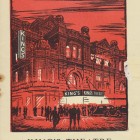Heure espagnole 1963Scottish Opera
Read more about the opera Heure espagnole
For Scottish Opera’s second season the number of venues doubled, with the addition of Edinburgh, and there were three programmes instead of two. Following the previous year's Puccini (Butterfly) and Debussy (Pelléas), the pattern was moved even more towards the unusual. A Verdi work might have been expected, but with the formation of the new Scottish Opera Chorus, Otello was chosen. An unusual double-bill of the company's first living composer, Dallapiccola, (Night Flight) and Ravel (L'Heure Espagnole) was certainly stimulating. It was not a surprise for a Mozart opera to be presented. However the choice of Seraglio was still a bold one, avoiding the obvious.
This double bill of unfamiliar twentieth century works was mounted in collaboration with the New Opera company, a London group managed by Peter Hemmings. The Ravel is still not as popular as it ought to be, though recent performances, on stage by the RSAMD students and in concert by the RSNO, indicate it may at last be gaining popularity. The Dallapiccola Night Flight, of which this was the British premiere, seems to have disappeared completely.
These were the only roles given with Scottish Opera by the great Australian singing actress Marie Collier, one of the stars of the Sadler's Wells company through the sixties. It was also unusual to see that great Verdi baritone Peter Glossop taking on a comic role.
Cast details are from Opera Scotland's copy of the programme.
Schedule foe Scottish Opera's Second Season - 1963
In Scottish Opera’s second season, one week was given in Glasgow followed by a week in Edinburgh
Glasgow, w/c 27 May: Mon 27 Otello; Tue 28 Seraglio; Wed 29 Volo di Notte and L’Heure Espagnole; Thu 30 Seraglio; Fri 31 Volo di Notte and L’Heure Espagnole; Sat 01 Otello.
Edinburgh, w/c 3 June: Mon 3 Otello; Tue 4 Seraglio; Wed 5 Volo di Notte and L’Heure Espagnole; Thu 6 Seraglio; Fri 7 Volo di Notte and L’Heure Espagnole; Sat 8 Otello.
Performance Cast
- Concepciòn wife of Torquemada
- Gonzalve a poet
- Torquemada a clock-maker
- Ramiro a muleteer
- Don Iñigo Gomez a banker

